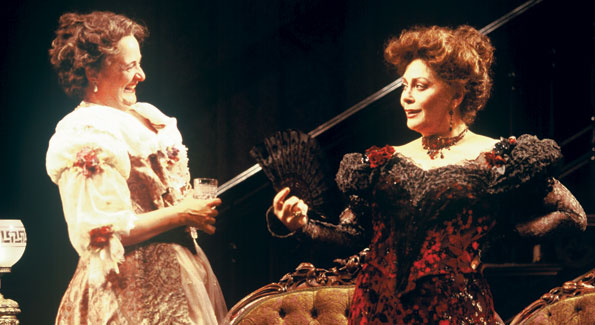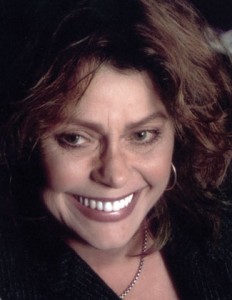Elizabeth Ashley opens up about her role in Mrs. Warren’s Profession, D.C. and acting.
By Julie LaPorte

Nancy Robinette as Birdie Hubbard and Elizabeth Ashley as Regina Giddens in the Shakespeare Theatre Company’s 2002 production of Lillian Hellman’s The Little Foxes, directed by Doug Hughes. Photo by Richard Termine.
Elizabeth Ashley welcomed me into her heavily air-conditioned dressing room after rehearsals for Mrs. Warren’s Profession, the George Bernard Shaw play that will open at the Shakespeare Theatre Company on June 8. The play, directed by Keith Baxter, is a story about a young girl who is scandalized when she discovers that her family’s considerable wealth comes from her mother’s management of several brothels.
Ms. Ashley was curled up with a blanket on the couch, still wearing her stage makeup and red wig. Her deep and husky voice was enthusiastic as she answered my questions, a welcoming smile on her face, meeting my eye in a way that made me feel like a co-conspirator in some delicious intrigue about to take place.
Julie LaPorte: How does D.C. compare with the other theatre towns you’ve played?
Elizabeth Ashley: D.C. is one of the most innovative and alive theatre towns, particularly in its small theatres and experimental groups. And I love D.C. audiences. They’re so smart and diverse. I think this particular play and this particular audience is a good fit.
JL: Tell me a little bit about Mrs. Warren’s Profession.
EA: It’s an early Shaw play. Shaw was one of the great philosophical heretics in many ways. In everything he wrote, he addressed himself to capitalism in all of its many manifestations. When this play was first written it was censored in England. The reason given was that it was unfit for the public because it dealt with prostitution. But personally I think, and I’m not alone in this, that was not the reason. The reason was because he addressed social inequality and the absurdities of it.
I don’t believe in museum theater.
There will be scholars or academics that are really going to take issue with my Mrs. Warren because I don’t see her the way she is classically been played. That’s what I find interesting about it. I think you always have to find what speaks to now. How does it inform us about how we live now?
If you’re going to do a revival play, the easiest thing in the world is to do it the conventional way. But an old play, a play that’s been done before, you figure, people know the old way. Let’s see what else it has to say. Now, you never do it for the sake of being different. But doing George Bernard Shaw in 1905 is different than doing George Bernard Shaw in 2010.
There are things in the play that speak to now so frighteningly. It’s awesome.
JL: Were there surprises for you in the role?
EA: I’ve been doing this for 52 years, so it’s hard to find something that is totally different from what I’ve played. However, Mrs. Warren is tricky because she’s never what she seems. Even when you’ve read the play a number of times, she’s never what she seems.
JL: Is there a message you hope audiences take away from the play?
EA: Yes, you need to think – is capitalism the answer or not? Because Shaw doesn’t draw a conclusion. You have to figure it out. Or else you don’t even have to think about those things. It’s just fun. You don’t have to go any deeper than that. I’m the actress; I’m the last person to ask! My job is to unravel and get to the center of the middle of the marrow of the thing. But it’s entertainment.
JL: You’ve spent years performing, not only on stage, but also on screen. Do you still love it?
EA: It’s a very noble profession. If you look at it, there are very few of us left who sweat to earn our living. We have to show up – and there is no safety net – eight times a week. And you sweat to earn your living. It certainly beats most jobs in that it requires above all else creative imagination. And if that muscle is constantly being used, it’s a good way of looking at the world.
JL: On one of your most recent projects you are playing Aunt Mimi on the new HBO series Treme, about rebuilding New Orleans after Hurricane Katrina. Tell me about that role.
EA: I play Steve Zahn’s aunt. Zahn’s character is a guy that is sort of a slacker, an unemployed DJ, from one of those Garden District families. And the producers wanted to have a character that would help explain what would have been the influence that made him the way he is as opposed to his old-line, extremely white Garden District family. So they invented Aunt Mimi who – well, there is always room for one more martini! She’s just a walking mardi gras. She’s great.
I think that Eric Overmyer and David Simon and the great David Mills (who is now dead), are probably the three best dramatic writers in the English language today. When my agent called about the role, I said ‘I don’t care what it is, if it’s one line. If it’s David Simon, I’m there.’
Ms. Ashley can be seen in Mrs. Warren’s Profession at the Shakespeare Theatre Company June 8 through July 11. For more information and tickets, visit their website.





